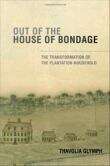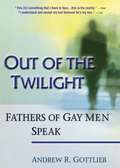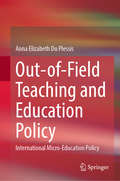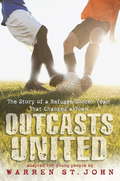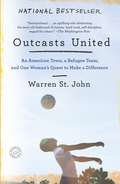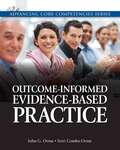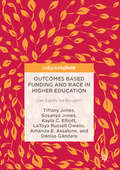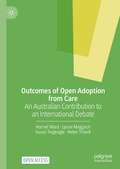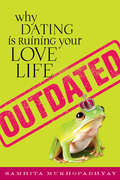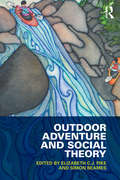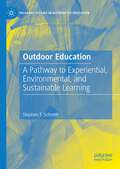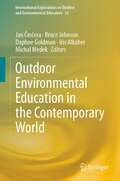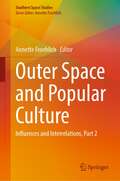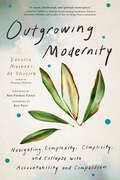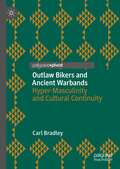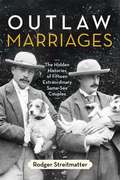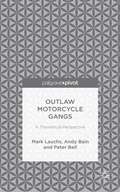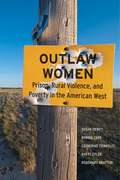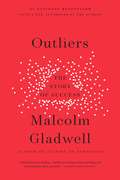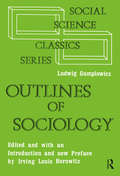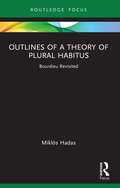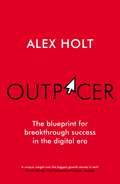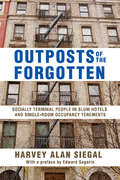- Table View
- List View
Out of the House of Bondage
by Thavolia GlymphThe plantation household was, first and foremost, a site of production. This fundamental fact has generally been overshadowed by popular and scholarly images of the plantation household as the source of slavery's redeeming qualities, where 'gentle' mistresses ministered to 'loyal' slaves. This book recounts a very different story. The very notion of a private sphere, as divorced from the immoral excesses of chattel slavery as from the amoral logic of market laws, functioned to conceal from public scrutiny the day-to-day struggles between enslaved women and their mistresses, subsumed within a logic of patriarchy. One of emancipation's unsung consequences was precisely the exposure to public view of the unbridgeable social distance between the women on whose labor the plantation household relied and the women who employed them. This is a story of race and gender, nation and citizenship, freedom and bondage in the nineteenth century South; a big abstract story that is composed of equally big personal stories.
Out of the Twilight: Fathers of Gay Men Speak
by Andrew GottliebHow would you react if your son told you he was gay?Out of the Twilight: Fathers of Gay Men Speak explores how fathers have dealt with discovering that their sons were gay and what effect it had on their own development as parents and people. This revealing, moving book will help you understand the difficulties and joys of a father/gay son relationship. Out of the Twilight draws from literary sources such as poems, fairy tales, plays, novels, and movies, as well as psychoanalytic theories, to highlight the obstacles that a father must overcome to understand and identify with his son. In Out of the Twilight, you will discover the personal and intimate struggles of these fathers, including: Mitchell, whose son, Jay, came out at the age of twenty-one, and who describes the coming-out process as a means of forging a closer father-son relationship Juan Miguel, who knew and accepted that his son was gay before his son told him, and who discusses how his love and complete acceptance made the coming-out process easier for his son Peter, whose response to his son, Richard, was ordering him to live at home so the family could look for a 'cure’for Richard's homosexuality Daniel, who admitted that he himself was gay after being married and who was very accepting when his son, Charles, came out since it provided them with a special bond Marty, whose response to his son Gary's coming out was to join P-FLAG, an organization for parents of gay and lesbian children, so he could find support and acceptance among other parents who were going through the same thingOut of the Twilight allows you to see how fathers have struggled with the truth about their sons' sexuality. This book presents a unique opportunity to develop a greater awareness of and appreciation for father/son similarities and differences, and suggests that through time, communication, and love, fathers can become comfortable with and respectful of their sons' homosexuality.
Out-of-Field Teaching and Education Policy: International Micro-Education Policy
by Anna Elizabeth Du PlessisThis book focuses on the elusive out-of-field teaching phenomenon and its direct effects on quality education globally. Based on the experiences and concerns of teachers and school leaders, it investigates the phenomenon’s impact on everyday teaching and school practices, and offers insights into the challenges that out-of-field teachers face in maintaining their role as the “knowledgeable counterpart” in their teaching and learning environments. In this frame, it also highlights the often-overlooked importance of initial teacher education and its preparation of prospective teachers for employment in complex school contexts, subjects or year levels. The book emphasises the need to develop specific policy strategies to effectively address the global implications of out-of-field teaching, and explores the potential of micro-education policies as targeted support resources for teachers in these challenging positions. Through this new policy lens, which renegotiates the discourse of education policy as a quality education improvement framework, the book offers readers a comprehensive understanding of the urgent need for policy to uphold all stakeholders involved in these unique and complex environments. Accordingly, the book is a valuable resource for academic advisors, decision-makers, policy-makers, and educational and school leaders in developing new approaches to improving school outcomes that promote the retention of teachers for a strong and stable teaching workforce.
Outcasts United
by Warren St. JohnThis young people's version of the adult bestseller is a complex and inspirational story about the the Fugees, a youth soccer team made up of refugees from around the world, and their formidable female coach. Clarkston, Georgia, was a typical southern town until it became a refugee resettlement center. The author explores how the community changed with the influx of refugees and how a single individual made a difference in the lives of so many.
Outcasts United: An American Town, a Refugee Team, and One Woman's Quest to Make a Difference
by Warren St. JohnThis young people's version of the adult bestseller is a complex and inspirational story about the the Fugees, a youth soccer team made up of refugees from around the world, and their formidable female coach. <P>Clarkston, Georgia, was a typical southern town until it became a refugee resettlement center. <P>The author explores how the community changed with the influx of refugees and how a single individual made a difference in the lives of so many.
Outcome-informed Evidence-based Practice (Advancing Core Competencies Ser.)
by Terri Combs-Orme John OrmeProvides practical ways to measure and monitor client progress. Part of Advancing Core Competencies Series, a unique series that helps students taking advanced social work courses apply CSWE’s core competencies and practice behaviors examples to specialized fields of practice. Outcome-Informed Evidence Based Practice shows students practical ways to measure and monitor client progress and use this feedback to help clients achieve their goals. Outcome Informed Evidence Based Practice places emphasis on social workers who provide direct services to clients, not only in clinical settings, but in a broad array of other settings such as schools, health care, social service agencies, residential facilities, and more. Using case examples in almost every chapter, this text highlights the diversity of clients encountered by social workers, providing real-world contexts for discussing chapter concepts. This text is also useful for psychologists, psychiatrists, counselors, nurses, physical and occupational therapists, and other allied health care and social service professionals. Learning Goals Upon completing the book, readers should be able to: Help clients make the best decisions by measuring and monitoring client progress, and modifying interventions accordingly, Graph, analyze, and interpret their client’s progress Recognize social workers should systematically measure and monitor their clients’ outcomes at regular frequent intervals Identify measurement issues that influence the quality of the information collected by them and their client
Outcomes Based Funding and Race in Higher Education
by Tiffany Jones Sosanya Jones Kayla C. Elliott Latoya Russell Owens Amanda E. Assalone Denisa GándaraThis book examines how Performance or Outcomes Based Funding (POBF) policies impact racial equity in higher education. Over the last decade, higher education has become entrenched in a movement that holds colleges and universities more accountable to its supporters. There are pressures to answer questions about student outcomes and performance, the value of education, the effectiveness of instructors, and the ability of existing leaders to manage efficiently and effectively. It is within this climate that states have adopted POBF policies. Through POBF, public colleges and universities receive state funding through formulas that no longer rely solely on student enrollment, but are instead based on student outcomes. This book provides an overview for policymakers of how racial equity has been addressed, the impact of these approaches, and recommendations for moving forward.
Outcomes Measurement in the Human Service: Cross-Cutting Issues and Methods (2nd Edition)
by Jennifer L. Magnabosco Ronald W. Manderscheidhe book provides readers with both macro- and micro-perspectives on the topics of outcomes measurement; incorporates practice, policy, and research perspectives; and examines current and long-standing issues within the human services field with regard to outcomes and performance measurement. With numerous authors from the field of social work, this new edition of Outcomes Measurement in the Human Services also boasts contributions from professionals in the fields of psychology, psychiatry, policy research, administration, and numerous other social sciences. With its thorough, authoritative coverage of the issues of outcomes measurement and accountability, this book is appropriate for and directly relevant to courses in evaluation research, clinical practice, social policy, and administration.
Outcomes of Open Adoption from Care: An Australian Contribution to an International Debate
by Harriet Ward Lynne Moggach Susan Tregeagle Helen TrivediThis Open Access book presents unique evidence from the first comprehensive study of the outcomes of open adoption from care in Australia. It contributes to the international debate concerning the advantages and disadvantages of face-to-face post adoption contact with birth families.The chapters assess whether adoption provides a better chance of permanence and more positive outcomes than long-term foster care for abused and neglected children in care who cannot safely return to their birth families. They also explore whether open adoption can avoid some of the detrimental consequences of past policies in which adoption was shrouded in secrecy and children frequently grew up with a conflicted sense of identity. The book will appeal to policy makers, practitioners and students of social policy, social work, the law, psychology and psychiatry. It should also be of interest to adult adoptees and adoptive parents, whose experiences it reflects.
Outdated: Why Dating Is Ruining Your Love Life
by Samhita MukhopadhyayRomance and love are in a state of crisis: Statistically speaking, young women today are living romantic lives of all kinds-but they're still feeling bogged down by social, cultural, economic, and familial pressures to love in a certain way. Young women in the modern world have greater flexibility than ever when it comes to who we choose to love and how we choose to love them; but while social circumstances may have changed since our parents' generation, certain life expectations remain. In Outdated, Samhita Mukhopadhyay addresses the difficulty of negotiating loving relationships within the borderlands of race, culture, class, and sexuality-and of holding true to our convictions and maintaining our independence while we do it.Outdated analyzes how different forms of media, cultural norms, family pressure, and even laws, are produced to scare women into believing that if they don't devote themselves to finding a man, they'll be doomed to a life of loneliness and shame. Using interviews with young women that are living around, between, within, and outside of the romantic industrial complex, Mukhopadhyay weaves a narrative of the alternative ways that women today have elected to live their lives, and in doing so offers a fresh, feminist look at an old topic: How do diverse, independent young women date happily and successfully-and outside of the box?
Outdoor Adventure and Social Theory
by Simon Beames Elizabeth C.J. PikeAdventure and outdoor sports - from rock climbing to freestyle kayaking – are a modern social phenomenon that can tell us much about the relationship between sport, culture and contemporary society. In this engaging new introductory text, adventure sports are used to illustrate key concepts in social theory and to demonstrate why an understanding of social theory is essential for any student taking a course in sport, adventure, or outdoor education. Each chapter in the book introduces a key ‘classical’ or modern social theorist, including Marx, Durkheim, Weber and Elias, or a universal topic or issue in social theory, such as sustainability, commodification or identity. Within each of those chapters the theorist or topic is brought to life through case studies of adventurous activities and lived experiences, helping the reader to connect their own sporting and adventurous interests with the frameworks we use to understand wider culture and society. Concise and full of cutting-edge contemporary examples, Outdoor Adventure and Social Theory is the perfect companion for any module on the sociology of sport, adventure or outdoor recreation.
Outdoor Education: A Pathway to Experiential, Environmental, and Sustainable Learning (Palgrave Studies in Alternative Education)
by Stephen T. SchrothThis book explores the phenomenon of outdoor education, an approach that permits children from all backgrounds to explore environmental, sustainability, and other issues facing them and their communities. Organized around both the conceptual and the practical issues facing school leaders interested in outdoor education, the book provides a wealth of resources for those interested in implementing outdoor education in their schools or classrooms. Infinitely flexible, outdoor education provides a lens through which teachers may explore any content area with any age group of children. Providing readers with both the theoretical underpinnings that support place-based curriculum as well as practical ways to implement an outdoor education program, the book also provides seven case studies that examine the issues facing school leaders desiring to make such a change. Outdoor Education: A Pathway to Experiential, Environmental, and Sustainable Learning guides those interested in exploring outdoor education through the curricular, instructional, and policy considerations needed to accomplish this goal.
Outdoor Environmental Education in the Contemporary World (International Explorations in Outdoor and Environmental Education #12)
by Bruce Johnson Jan Činčera Daphne Goldman Iris Alkaher Michal MedekThis edited volume explores the role of outdoor environmental education in the contemporary society. It identifies some of the opportunities and challenges of this educational area, particularly in the growing digitalization of the contemporary society and the distancing between people and nature. Furthermore, it seeks to answer why outdoor environmental education is essential for developing students’ environmental citizenship competencies or developing their relationship with nature. The book also introduces the various approaches existing in the field, discusses their relevance, and highlights their unique features. The book finishes with an overview of the practice of outdoor environmental education in selected countries from North America, Europe, and Asia.
Outer Space and Popular Culture: Influences and Interrelations, Part 2 (Southern Space Studies)
by Annette FroehlichFollowing on from Part 1, which was highly acclaimed by the space community, this peer-viewed book provides detailed insights into how space and popular culture intersect across a broad spectrum of areas, including cinema, music, art, arcade games, cartoons, comics, and advertisements. This is a pertinent topic since the use of space themes differs in different cultural contexts, and these themes can be used to explore various aspects of the human condition and provide a context for social commentary on politically sensitive issues. With the use of space imagery evolving over the past sixty years of the space age, this topic is ripe for in-depth exploration. Covering a wide array of relevant and timely topics, the book examines the intersections between space and popular culture, and offers accounts of space and its effect on culture, language, and storytelling from the southern regions of the world.
Outgrowing Modernity: Navigating Complexity, Complicity, and Collapse with Accountability and Compassion
by Vanessa Machado de OliveiraThe inevitable is coming fast. We know it in our bones—and it&’s past time to face it. The highly anticipated follow-up to Hospicing Modernity: how we activate responsibility, nurture care, and grow up in the face of collapse—includes reflections, exercises, and promptsClimate collapse, social crisis, the decline of modernity: colonialism, capitalism, and our full-faced denial have ushered in an urgent new era. Hospicing Modernity asked us to grow up, step up, and show up for our communities and the living Earth. Outgrowing Modernity helps us make sense of where we&’re going—and deepen what&’s possible—in a time of endings.Vanessa Machado De Oliveira helps us face the logics and workings of modernity, bringing us to clear-eyed terms with its expiration. She explores the impacts of colonialism as neurocolonization: an oppressive function of modernity that rewires how we think, act, imagine, and adapt. These impacts are wide-ranging and run deep: they cut us off from our natural ways of building community and seeking pleasure. They choke our ability to cope with trauma and embrace complexity. And they trap us in a state of artificial comfort and denial that keeps us from collectively growing up—even when our existence demands it.This book invites you to interrupt 5 lies that neurocolonization instills in us—beliefs (and behaviors) that have condition us to think we&’re owed the following, regardless of others or the planet:Moral and epistemic self-righteous authorityUnrestricted, unaccountable autonomyArbitrating truth, law, and common senseAffirming one's virtues, innocence, and purityExploitative appropriation and accumulation of various forms of capitalIn moving away from these ingrained worldviews, we can choose instead to develop 4 capacities necessary to our—and Earth&’s—survival: sobriety, maturity, discernment, and responsibility.Machado De Oliveira moves beyond critique into a praxis of strategic disinvestment: one that invites us to recognize what no longer serves us and reinvest in nurturing structures and lifeways that restore our knowledge in the value of life for life&’s sake.
Outlaw Bikers and Ancient Warbands: Hyper-Masculinity and Cultural Continuity
by Carl BradleyThis book is the first to compare the shared cultural tenets of ancient warbands and outlaw biker gangs. It argues that the values of hyper-masculinity can be traced from the former into the contemporary environment of the latter: codes of honour, loyalty and bravery have prioritised small groups of males over women and other men, creating a history of hyper-masculinity that shows little sign of stopping. Indeed, Outlaw Bikers and Ancient Warbands: Hyper-Masculinity and Cultural Continuity argues that such hyper-masculine culture can be found in many male groups such as the police, military and sports, and that if we want to understand hyper-masculinity and face it as a society then we need to recognize that outlaw bikers are a reflection of behavior that has a very long tradition. This pioneering work explores these issues from ancient times and into the future.
Outlaw Culture: Resisting Representations
by Bell HooksIn this collection of essays, noted feminist thinker Bell Hooks critically analyzes a number of popular cultural practices and icons. Topics include the paintings of artist Jean-Michel Basquiat, the polemics of author Katie Roiphe, and the politics of rapper Ice Cube.
Outlaw Marriages: The Hidden Histories of Fifteen Extraordinary Same-sex Couples
by Rodger StreitmatterYears before gay marriage became a hot-button political issue, same-sex unions flourished in America. In Outlaw Marriages, cultural historian Rodger Streitmatter reveals that gay marriage isn't a twenty-first-century idea. He spans over a hundred years and profiles fifteen couples who made major contributions to this country in an impressive range of fields--from music and education to journalism and modern art. Among the notables whose lives and loves are profiled are poet Walt Whitman, literary icon Gertrude Stein, movie legend Greta Garbo, playwright Tennessee Williams, novelist James Baldwin, and activist Audre Lorde. While no partnership is the same--some were tumultuous, while others were more supportive and long-lasting--all changed the course of American history.
Outlaw Motorcycle Gangs: A Theoretical Perspective
by Peter Bell Andy Bain Mark LauchsOutlaw Motorcycle Gangs are increasingly seen as a threat to communities around the world. They are a visible threat as a recognizable symbol of deviance and violence. This book discusses the social context within which Outlaw Motorcycle Gangs and groups have emerged and the implication of labelling these groups as deviant and outlaw. There is no doubt that members of these clubs have been involved in serious criminal activity and this book explores whether gang and organised crime theory can effectively explain their criminal activities. Importantly, the book also assesses policing and political responses to the clubs' activities. It argues that there is an increasing need for national and international cooperation on the part of law enforcement agencies with various levels of government as well as the private sector. Importantly, the book offers suggestions for the best responses to the crimes committed by members of Outlaw Motorcycle Gangs.
Outlaw Women: Prison, Rural Violence, and Poverty in the New American West
by Susan Dewey Bonnie Zare Catherine Connolly Rhett Epler Rosemary BrattonA journey into the experiences of incarcerated women in rural areas, revealing how location can reinforce gendered violenceIncarceration is all too often depicted as an urban problem, a male problem, a problem that disproportionately affects people of color. This book, however, takes readers to the heart of the struggles of the outlaw women of the rural West, considering how poverty and gendered violence overlap to keep women literally and figuratively imprisoned. Outlaw Women examines the forces that shape women’s experiences of incarceration and release from prison in the remote, predominantly white communities that many Americans still think of as “the Western frontier.” Drawing on dozens of interviews with women in the state of Wyoming who were incarcerated or on parole, the authors provide an in-depth examination of women’s perceptions of their lives before, during, and after imprisonment. Considering cultural mores specific to the rural West, the authors identify the forces that consistently trap women in cycles of crime and violence in these regions: felony-related discrimination, the geographic isolation that traps women in abusive relationships, and cultural stigmas surrounding addiction, poverty, and precarious interpersonal relationships. Following incarceration, women in these areas face additional, region-specific obstacles as they attempt to reintegrate into society, including limited social services, significant gender wage gaps, and even severe weather conditions that restrict travel. The book ultimately concludes with new, evidence-based recommendations for addressing the challenges these women face.
Outliers: The Story of Success
by Malcolm GladwellMalcolm Gladwell, bestselling author of Blink and The Bomber Mafia and host of the podcast Revisionist History, explores what sets high achievers apart—from Bill Gates to the Beatles—in this seminal work from "a singular talent" (New York Times Book Review). In this stunning book, Malcolm Gladwell takes us on an intellectual journey through the world of "outliers"—the best and the brightest, the most famous and the most successful. He asks the question: what makes high-achievers different? His answer is that we pay too much attention to what successful people are like, and too little attention to where they are from: that is, their culture, their family, their generation, and the idiosyncratic experiences of their upbringing. Along the way he explains the secrets of software billionaires, what it takes to be a great soccer player, why Asians are good at math, and what made the Beatles the greatest rock band. Brilliant and entertaining, Outliers is a landmark work that will simultaneously delight and illuminate.
Outlines of Sociology (European Sociology Ser.)
by Ludwig GumplowiczThis book arouses discussion about the place of Ludwig Gumplowicz in the history of sociology. It offers an overview of Gumplowicz' main ideas in general, particularly those expressed in his other major work, Der Rassenkampf, and an examination of the men and movements in sociology.
Outlines of a Theory of Plural Habitus: Bourdieu Revisited (Routledge Studies in Social and Political Thought)
by Miklós HadasThis book explores the thought of Pierre Bourdieu, one of the most influential sociologists of the twentieth century, proposing a modification and extension of his concept of habitus. Building on Bourdieu’s notion of the translational reproduction of social structure – the idea that while social classes move in the same direction, dominant groups are able to preserve their relative power position, thus maintaining the structure of the gap – the author proposes that as social structures change, habitus change correspondingly, and thus become plural. Informed by Norbert Elias’ process sociology, this volume offers examples of habitus pluralisation, arguing that this modification of Bourdieu’s thought renders it more suitable for the study of social changes and represents the development of a path that Bourdieu himself had begun to explore in the later stages of his career. As such it will appeal to scholars of sociology and social theory with interests in historical sociology, process sociology, social structures and the thought of Bourdieu.
Outpacer: The Blueprint for Breakthrough Success in the Digital Era
by Alex HoltOver the past decade a small number of companies have changed every aspect of how we live, work and play. These Outpacers have become enormous global businesses with companies like Google, Amazon, Netflix, Salesforce, Meta, Tesla and Apple all totally redefining what a successful organization looks and feels like.Each chapter in Outpacer focusses on an Outpacer characteristic required for organisational greatness and features examples of what it is and how to achieve it, including; how to structure your company's mission and vision, foster the right entrepreneurial culture, innovate, collaborate and utilise agile technology and data driven insights to drive continuous progress, deliver an exceptional customer experience and achieve outstanding results.Each Outpacer characteristic is illustrated by fascinating profiles of business leaders from companies such as Google, Amazon, Apple and Tesla who have driven phenomenal success, alongside profiles of the stars of film, tv, music and sport who share the same winning characteristic such as Reese Witherspoon, Jay Z and Sir Lewis Hamilton. The combination of business leaders and popular icons illustrate and inspire the reader helping them to learn how they too can lead an Outpacer business. This is not business as usual.
Outposts of the Forgotten: Socially Terminal People in Slum Hotels and Single Occupancy Tenements
by Harvey Alan SiegalThe single-room occupancy (SRO) tenements and welfare hotels located throughout New York City, but concentrated on the Upper West Side of Manhattan, provided housing for many of society's troubled, marginal members in the late 1970s, when this book was originally published. The predominant population of these buildings was old, non-white, unemployed, disabled, and in poor health. What distinguished this community, however, was not that it is was part of a ghetto or slum, but that it was composed of poor people living amidst affluence, combining elements of both the law-abiding and criminal worlds.Institutionally, the SRO tenement world described in this book is seen as a half-way area between open society and the total institution. Without the support and control available in the SROs, confinement in a total institution would be a certainty for many of the residents. This book, a participant-observer journal as well as an ethnographic study, suggests an alternative to institutionalization.As Edward Sagarin notes in his preface, Siegal does not lack compassion for the sufferings of the people, but the focus is on the descriptions of their lives. Outposts of the Forgotten documents the circumstances of some of New York's forgotten residents.
